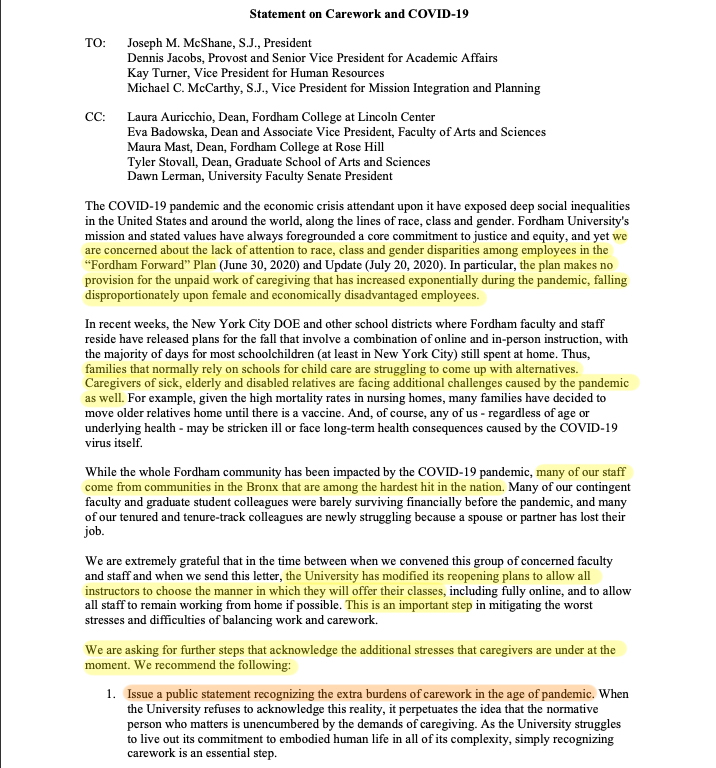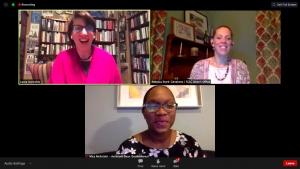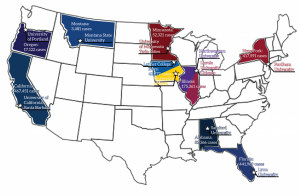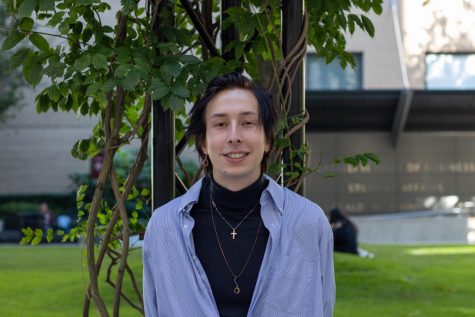Employees Release Statement on Caregiver Support
August 11, 2020
More than 280 Fordham employees signed and sent a statement regarding COVID-19 and carework on Tuesday, Aug. 4, addressing Fordham’s “lack of attention to race, class and gender disparities among employees” in its reopening plan.
The statement highlights the absence of support for employees who have become caregivers during the pandemic, saying that the unpaid role falls “disproportionately upon female and economically disadvantaged employees.”
“For most of us, in-person teaching seemed insurmountable,” Carey Kasten, associate professor of Spanish, said.
“How to teach on campus when our children are home and in need of help to login to virtual classes? How to hire a sitter during a pandemic, when you do not know the number of hours/which days your child will be in school (not to mention questions of exposure and contact tracing)? There were and still are many questions of this nature.”
Fordham employees with children will be balancing their students and their families’ education this semester. The NYC Department of Education’s fall plan lays out a hybrid model where students will be spending the majority of the school week learning remotely at home. Many schools will not reopen in-person, leaving parents responsible for providing care for at-home students.
Others are also caring for elderly or disabled family members who may have been impacted by COVID-19.
“Our group shared feelings of failure and despair around their multiple caregiving roles: we felt torn between our students and our families and our communities, and devastated and afraid that we couldn’t give any one of those important roles all the attention,” Margaret Schwartz, associate professor of communication and media studies, said.
The email was sent to University President Rev. Joseph M. McShane, S.J., Provost and Senior Vice President for Academic Affairs Dennis Jacobs, Vice President for Human Resources Kay Turner, Vice President for Mission Integration and Planning Michael C. McCarthy, S.J., and the deans at both Lincoln Center and Rose Hill.
Organizing began in March through a listserv, an email list communication, where faculty and administrators shared their situations. “We acknowledged how much we all were struggling with the challenging situation of caring for small children at home while also teaching full-time,” Kasten said.
Many employees started learning what their children’s fall plans would be in July, making planning for the fall more complicated. Several employees created a listserv for caregivers to widen the range of perspectives.
“The listserv crucially included/invited staff and Service Employees International Union faculty as well as tenured and tenure-track faculty, allowing us to build solidarity across departments and roles,” Diana Kamin, a lecturer in the communication and media studies department, said.
The staff and faculty who collectively worked on the statement recommended nine further steps of action to aid employees beyond the ability for instructors to choose their preferred method of class instruction — including fully online.
“Now that we can choose our modality, we would like the university at the very least to recognize the burdens put on caregivers. Even better, they could commit to some structural changes with research funding,” Kasten said.
Recommendations include Fordham issuing a public statement recognizing the mounting burden of care work in the age of pandemic, allowing employees to continue working from home until there is a vaccine or consistently effective treatment — instead of deciding on a semester-by-semester basis — and creating an emergency dependent care fund for all employees.
According to Karina Hogan, associate professor of theology, faculty are currently not allowed to spend research grant money on dependent care, even though she said uninterrupted time is needed to complete research.
“We are being asked to spend our time this summer preparing to teach in a new hybrid model, while also (many of us) trying to keep our kids occupied, all the while the clock is ticking on our research grants or our tenure clocks,” Hogan said.
The statement also requests continued support of employees conducting research and halting nonessential committee work at all levels of the university.
Organizers called for a suspension of Students’ Evaluation of Educational Quality (SEEQ) Surveys, which are influential in determining whether an instructor’s contract is renewed for the upcoming academic year.
“Students may not know that SEEQS can play an enormous role in how contract instructors are hired and how tenure and promotion is evaluated for tenure track employment,” Schwartz said.
“We feel that the most vulnerable instructors (those with carework responsibilities and without tenure) should not be judged solely based on student perceptions of how they handled teaching in these extraordinary circumstances,” Hogan explained.
Developing a committee for the 2021-22 academic year is another request with the intent to reevaluate departmental norms for tenure, promotion and retention in light of the pandemic and increased role of caregivers. The final recommendation urges Fordham to create long-term, institutionalized and financial solutions to provide affordable child care for all Fordham employees.
“Fordham doesn’t offer faculty housing or on-site daycare services, either. For those of us who have to spend long hours on commute and have to pay full fee to babysitters, etc, working at Fordham has been challenging physically and financially,” Asato Ikeda, assistant professor of art history, said.
“At minimum, we expect a statement from the upper administration acknowledging the exceptional strain that the pandemic puts on caregivers, and the unequally distributed burden of carework in our society,” Hogan said.
















